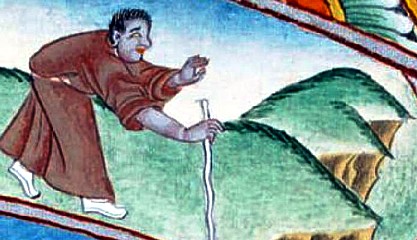Ignorance: Difference between revisions
Jump to navigation
Jump to search
No edit summary |
mNo edit summary |
||
| (2 intermediate revisions by one other user not shown) | |||
| Line 1: | Line 1: | ||
[[Image:Ignorance.JPG|frame|An old blind man groping for his way with a cane, the image for ignorance in the [[Wheel of Life]]]] | [[Image:Ignorance.JPG|frame|An old blind man groping for his way with a cane, the image for ignorance in the [[Wheel of Life]]]] | ||
'''Ignorance''' or mis-knowing (Skt. ''avidyā''; Tib. [[མ་རིག་པ་]], ''ma rigpa'') — one of the [[fifty-one mental states]] defined in [[Abhidharma]] literature. According to the ''[[Compendium of Abhidharma]]'', it belongs to the subgroup of the [[ | '''Ignorance''' or '''mis-knowing''' (Skt. ''avidyā''; Tib. [[མ་རིག་པ་]], ''ma rigpa'', [[Wyl.]] ''ma rig pa'') — one of the [[fifty-one mental states]] defined in [[Abhidharma]] literature. According to the ''[[Compendium of Abhidharma]]'', it belongs to the subgroup of the [[six root destructive emotions]]. It is also the first of the [[twelve links of dependent origination]] and the basis of all other [[destructive emotions]]. | ||
==Definitions== | ==Definitions== | ||
In the [[Khenjuk]], [[Mipham Rinpoche]] says: | In the [[Khenjuk]], [[Mipham Rinpoche]] says: | ||
*Tib. མ་རིག་པ་ནི་ལས་འབྲས་དང་བདེན་པ་དཀོན་མཆོག་རྣམས་ཀྱི་ཚུལ་མི་ཤེས་པ་སྟེ། ཀུན་ཉོན་རྣམས་འབྱུང་བར་བྱེད་པའོ། | *Tib. མ་རིག་པ་ནི་ལས་འབྲས་དང་བདེན་པ་དཀོན་མཆོག་རྣམས་ཀྱི་ཚུལ་མི་ཤེས་པ་སྟེ། ཀུན་ཉོན་རྣམས་འབྱུང་བར་བྱེད་པའོ། | ||
*Ignorance is not knowing [the law of] karma of cause and effect, the [four] truths, and the [virtues of the] Buddha, Dharma and | *Ignorance is not knowing [the law of] [[karma]] of cause and effect, the [four] [[four noble truths|truths]], and the [virtues of the] [[Buddha]], [[Dharma]] and [[Sangha]]. It causes the [[thorough affliction]] to arise.([[Rigpa Translations]]) | ||
*Ignorance means not knowing the [law of] actions and their effects, the [four] truths, and the [virtues of the] Precious Ones. It causes all affliction to occur. ([[Erik Pema Kunsang]]) | *Ignorance means not knowing the [law of] actions and their effects, the [four] truths, and the [virtues of the] Precious Ones. It causes all affliction to occur. ([[Erik Pema Kunsang]]) | ||
| Line 19: | Line 19: | ||
[[Category:Key Terms]] | [[Category:Key Terms]] | ||
[[Category: | [[Category:Destructive Emotions]] | ||
[[Category:Six root disturbing emotions]] | |||
[[Category:Fifty-one mental states]] | [[Category:Fifty-one mental states]] | ||
[[Category: | [[Category:Twelve links]] | ||
Revision as of 05:15, 29 March 2018

Ignorance or mis-knowing (Skt. avidyā; Tib. མ་རིག་པ་, ma rigpa, Wyl. ma rig pa) — one of the fifty-one mental states defined in Abhidharma literature. According to the Compendium of Abhidharma, it belongs to the subgroup of the six root destructive emotions. It is also the first of the twelve links of dependent origination and the basis of all other destructive emotions.
Definitions
In the Khenjuk, Mipham Rinpoche says:
- Tib. མ་རིག་པ་ནི་ལས་འབྲས་དང་བདེན་པ་དཀོན་མཆོག་རྣམས་ཀྱི་ཚུལ་མི་ཤེས་པ་སྟེ། ཀུན་ཉོན་རྣམས་འབྱུང་བར་བྱེད་པའོ།
- Ignorance is not knowing [the law of] karma of cause and effect, the [four] truths, and the [virtues of the] Buddha, Dharma and Sangha. It causes the thorough affliction to arise.(Rigpa Translations)
- Ignorance means not knowing the [law of] actions and their effects, the [four] truths, and the [virtues of the] Precious Ones. It causes all affliction to occur. (Erik Pema Kunsang)
In the Dzogchen teachings ignorance is said to be the failure to recognize our true nature.
Alternative Translations
- Unawareness (Matthew Kapstein)
- Delusion (for (rmongs pa), David Karma Choepel)